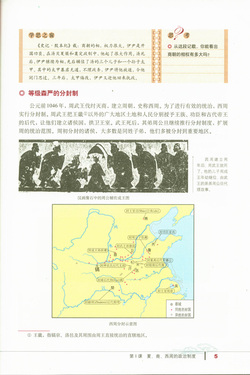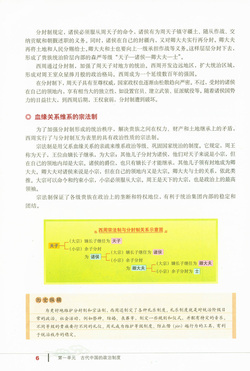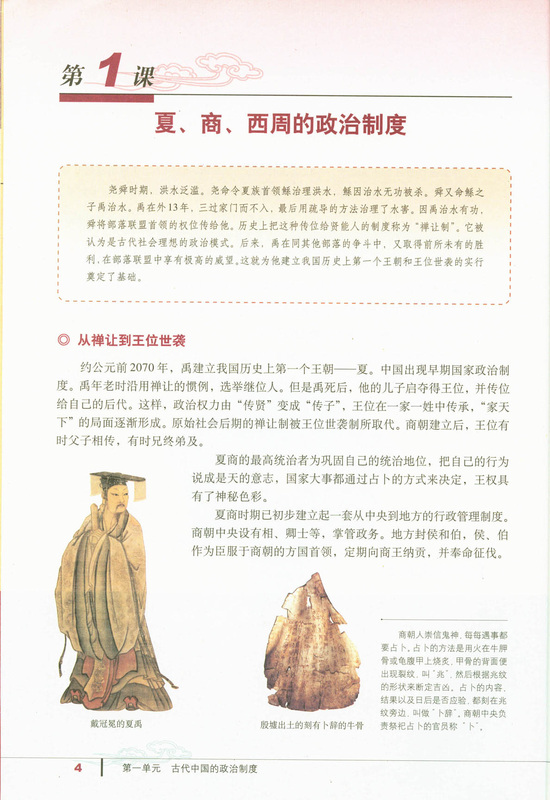The Political System of the Xia, Shang and Western Zhou Dynasties
In 2070 B.C., Yu the Great founded our country’s first monarchical dynasty—the Xia Dynasty, and from this emerged China’s early national political system. In his old age, Yu the Great continued the convention of selecting his own successor; however, after his death his son, Qi seized the throne and gave the succession to his own offspring. In this way, the transfer of political power went from “Succession of the Virtuous” to “Succession of the Progeny”, with the throne passing down to a king’s son. From this situation slowly emerged the notion of a “Heavenly Family”, and the system of willful abdication of power seen in the late stages of early Chinese society was replaced by a hereditary system. After the establishment of the Shang dynasty, the throne was passed on mainly from either father to son, or from one brother to another.
In order to consolidate their power, rulers of the Xia and Shang dynasty proclaimed their actions as the will of heaven, and decisions of importance were made through divination, shrouding the authority of the emperor in air of mysticism.
From the beginning of the Xia and Shang dynasty a comprehensive system of administrative management was established from the central government to the local government levels. The central government of the Shang dynasty had no ministers (相) or titled retainers (卿士) in charge of administrative affairs. Local titles conferred included marquis (候) and earl (伯), who served as local leaders, paid regular tribute to the Shang emperor, and enacted punitive orders.
Translation note: Often times in the Chinese writing, geographical China will be not be expressed "中国", but as "我国" or "祖国" which can be translated as "My Country" or "The Motherland" respectively.
In 2070 B.C., Yu the Great founded our country’s first monarchical dynasty—the Xia Dynasty, and from this emerged China’s early national political system. In his old age, Yu the Great continued the convention of selecting his own successor; however, after his death his son, Qi seized the throne and gave the succession to his own offspring. In this way, the transfer of political power went from “Succession of the Virtuous” to “Succession of the Progeny”, with the throne passing down to a king’s son. From this situation slowly emerged the notion of a “Heavenly Family”, and the system of willful abdication of power seen in the late stages of early Chinese society was replaced by a hereditary system. After the establishment of the Shang dynasty, the throne was passed on mainly from either father to son, or from one brother to another.
In order to consolidate their power, rulers of the Xia and Shang dynasty proclaimed their actions as the will of heaven, and decisions of importance were made through divination, shrouding the authority of the emperor in air of mysticism.
From the beginning of the Xia and Shang dynasty a comprehensive system of administrative management was established from the central government to the local government levels. The central government of the Shang dynasty had no ministers (相) or titled retainers (卿士) in charge of administrative affairs. Local titles conferred included marquis (候) and earl (伯), who served as local leaders, paid regular tribute to the Shang emperor, and enacted punitive orders.
Translation note: Often times in the Chinese writing, geographical China will be not be expressed "中国", but as "我国" or "祖国" which can be translated as "My Country" or "The Motherland" respectively.

A Strict System of Enfeoffment
1046 B.C., The King Zhou defeated the last emperor of the Shang Dynasty to establish the Zhou Dynasty, historically referred to as the Western Zhou Dynasty. To implement more effective governance, the Western Zhou dynasty created the system of enfeoffment. King Wu of Zhou bestowed both land and men to members of the royal family, outstanding loyalists, as well as the sons of former emperors so they could establish hereditary fiefdoms, and protect the imperial court. After the death of King Wu of Zhou, his younger brother Zhou Gong Dan continued to utilize this system of enfeoffment and further develop the scale of the Zhou dynasty. Many of the fiefdoms created in the early Zhou dynasty were created for offspring of the imperial family, were placed strategically around the kingdom.
1046 B.C., The King Zhou defeated the last emperor of the Shang Dynasty to establish the Zhou Dynasty, historically referred to as the Western Zhou Dynasty. To implement more effective governance, the Western Zhou dynasty created the system of enfeoffment. King Wu of Zhou bestowed both land and men to members of the royal family, outstanding loyalists, as well as the sons of former emperors so they could establish hereditary fiefdoms, and protect the imperial court. After the death of King Wu of Zhou, his younger brother Zhou Gong Dan continued to utilize this system of enfeoffment and further develop the scale of the Zhou dynasty. Many of the fiefdoms created in the early Zhou dynasty were created for offspring of the imperial family, were placed strategically around the kingdom.

The system of enfeoffment stipulated that lords (诸侯) must obey orders given by “the Heavenly Prince” (周天子), guard his strategic territory, obey him in matters of war, pay monetary tribute, and respect their imperial duties. At the same time, in their own territory, imperial fiefdoms were further divided, with retainers (卿士夫) responsible for bestowing land and manpower to their knights (士). Both these retainers and knights were obligated to their superiors in both war and peace. This tiered feudal enfeoffment system gave shape to the strict system of internal classification amongst nobles, leading to the phrase, “for the Heavenly Prince a Lord, for the Retainer a Knight”.
Through the system of enfeoffment the King of Zhou strengthened imperial rule over his territories. As the Western Zhou Dynasty began to develop at the border regions enlarging the area of its kingdom, it gave rise to a political structure that revolved tightly around the imperial court. The Western Zhou dynasty became a powerful dynasty that lasted for hundreds of years.
Under the system of enfeoffment, the King of Zhou enjoyed enormous power, and the strength of the government gradually became tighter and more precise. Nevertheless, those given titles enjoyed great independence within their own territory, such the power to installing officials, create armed forces, levy taxes, etc. As these fiefdoms rose in strength the power of the emperor declined greatly, leading to the break-up of this system of enfeoffment in the late Western Zhou Dynasty.
Through the system of enfeoffment the King of Zhou strengthened imperial rule over his territories. As the Western Zhou Dynasty began to develop at the border regions enlarging the area of its kingdom, it gave rise to a political structure that revolved tightly around the imperial court. The Western Zhou dynasty became a powerful dynasty that lasted for hundreds of years.
Under the system of enfeoffment, the King of Zhou enjoyed enormous power, and the strength of the government gradually became tighter and more precise. Nevertheless, those given titles enjoyed great independence within their own territory, such the power to installing officials, create armed forces, levy taxes, etc. As these fiefdoms rose in strength the power of the emperor declined greatly, leading to the break-up of this system of enfeoffment in the late Western Zhou Dynasty.

 RSS Feed
RSS Feed